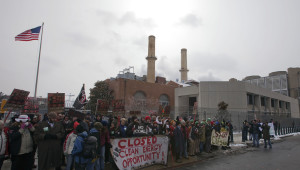Environmental Activism Close to Home
 I often feel there is a disconnect between the global environmental problems that I want to solve and the actions that I am capable of taking to influence them. I find myself asking, “Will this petition actually do anything to slow global warming? Will any lawmakers notice a rally that I participate in?” While these actions are extremely important, it is easy to feel helpless and disillusioned in the face of immense, global problems such as climate change.
I often feel there is a disconnect between the global environmental problems that I want to solve and the actions that I am capable of taking to influence them. I find myself asking, “Will this petition actually do anything to slow global warming? Will any lawmakers notice a rally that I participate in?” While these actions are extremely important, it is easy to feel helpless and disillusioned in the face of immense, global problems such as climate change.
Well fear not, my fellow disillusioned students. Environmental activism has come to Wash U’s campus, and it is not going away until we enact change that will affect issues on campus and around the globe. On November 2, Washington University hosted “America’s Energy Future” Symposium, a conference about our country’s future energy options. The seven panelists at the symposium included Stephen Lear, the president and CEO of Arch Coal, Fred Palmer, the senior vice president of government relations at Peabody Energy, Dan Cole, the senior vice president of Ameren energy, and Martha Schlicher, the senior vice president of biofuels at Monsanto. These panelists presented a view of an energy future that focuses on nuclear energy, biofuels, and so-called “Clean Coal”, with limited discussion of truly renewable energy sources such as wind and solar power. Much of what was presented at the symposium sounded like propaganda for the individual companies instead of an informed discussion about the environmental, technological, economic, and political issues confronting the energy industry.
The selection of speakers at the symposium was particularly disturbing, given that the Wash U board of trustees includes executives from Peabody Energy, Ameren, and Arch Coal, and that these companies fund the University’s Consortium for Clean Coal Utilization (CCCU) that was created last December. This calls into question the integrity of the symposium and suggests that the speakers were chosen because of their intimate relationship with Wash U, instead of any expertise or impartial opinions they could have to offer.
Students were not about to sit back as these companies presented an energy future that lacked renewable energy sources. At the reception following the symposium, almost one hundred students from groups such as Students from Endowment Transparency, Green Action, the Burning Kumquat, and the Wash U Peace Coalition, participated in a flash mob to protest the energy future presented at the symposium. (You can watch the video of the flash mob here: http://www.studlife.com/news/2009/11/04/fighting-the-coal-executives-feature-photo/ ). They then held an alternate symposium, which featured presentations of student research in renewable energy and discussion of how to incorporate these sources in the near future.
And they did not stop there. In response to the collaboration of groups participating in the flash mob, students formed the Washington University Climate Justice Alliance (WUCJA), a coalition of over ten student groups concerned about climate change as a social justice issue. (You can access WUCJA’s blog here: http://wucja.wordpress.com/ ). WUCJA’s first project is to urge the administration to change the name of the Consortium for Clean Coal Utilization to reflect the true nature of the research being done. “Clean Coal” is an industry marketing term intended to conceal the negative environmental effects of coal extraction, combustion, and disposal. The research being done in the consortium is important in determining how we can reduce our greenhouse gas emissions given the current infrastructure and energy consumption in this country. However, the usage of the term “clean coal” calls into question the integrity of our University and its relationship with the coal companies that fund the Consortium.
Not long ago, the Student Union Senate unanimously passed a resolution urging the administration to change the name of the CCCU to reflect the fact that “clean coal” is a marketing term and does not accurately represent the research that is taking place under the Consortium. While debating the resolution, many of the senators applauded the large number of constituent emails they received urging them to support the resolution, as well as the high student turnout at the senate meeting. This outpouring of student support may be a major reason for this resolution’s success.
In the resolution, the senate, “strongly urges the Washington University administration to change the name of the Consortium for Clean Coal Utilization” and “urges that the Consortium’s research into future uses of coal include studies of the social and environmental effects of its extraction, combustion, and disposal”. From this resolution, and the growing student movement that accompanies it, the chancellor and other leaders of the CCCU will see that students are concerned about the use of the “clean coal” misnomer, and may change the name and decrease the influence that coal and energy companies have over our school.
This is not a time to feel disillusioned about how to solve the massive environmental problems that we face. Rather, it is an opportunity to feel empowered, to know that we, as students, have an opportunity to enact real change at our university and contribute to solving these problems. Now is the time to do the research, to get questions answered, and to fight for a school whose research is motivated by knowledge and not by the interests of corporations.